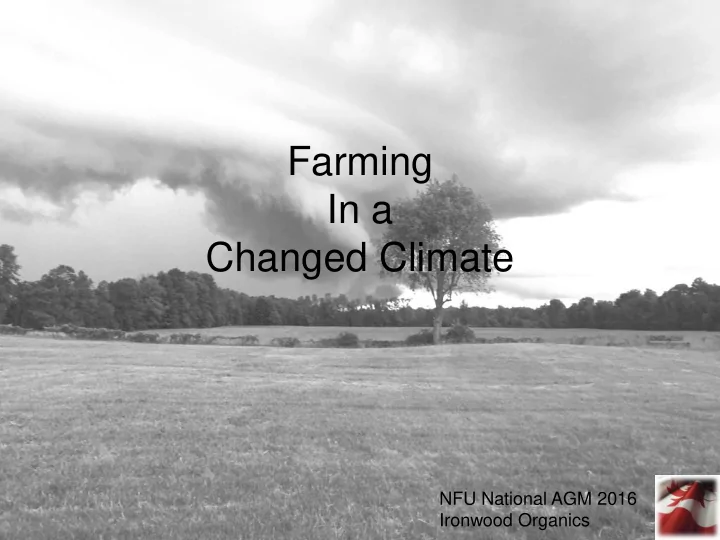

Farming In a Changed Climate NFU National AGM 2016 Ironwood Organics
Changed Climate • Changes will probably outlast our lifetime • I will not see the ‘deep’ benefits of my actions • Long term solutions are more of a method than an activity
Pressure from all sides • Physical Environment Impact – Too much and not enough (wind, precipitation, temp) – Unstable temporal fluctuation – Soil management • Crop Impact – Physical – Disease – Nutrition • Financial impact – Volatile revenue stream / crop prices • Physical infrastructure impact – Possible capital losses
3 Mitigation Strategies 1. Modulate / dampen the physical effects 2. Biodiversity Diversity -> Resiliency -> Sustainability 3. Crop, varieties and diversity – Annual, perennial, permaculture – Above and below ground – Temporal shift (from season to decades)
Trees and hedge rows • Deciduous trees mechanical • In Summer slows wind slow winds – Decrease transpiration and evaporation • Tap-root trees – Decreases cereal lodging – Cycle water – Reduces soil erosion – Resistant to strong winds • Mitigates extreme temperatures • In winter, aids in snow – Protects against late/early frosts deposition – Reduces wind-chill – Increases aquifer recharge • Creates ‘pathways’ to connect – Reduce soil erosion contiguous forest blocks. – Traps blowing soil from ‘elsewhere’ – Insulates fall cereals – Habitat for overwintering birds
Hedge Rows and Biodiversity • Supports rich biodiversity – Maximize trophic levels – Reduces insect problem • Short term carbon sink • Annual leaf mulch adds to soil organic matter • Supports underground biodiversity • Sacrifice a portion of production area – Plow until clip tree roots – Creates a 15’ - 20’ perimeter fallow buffer – Acts as a mycelium inoculants to fields
Soil Organic Matter • Soil biology is – Critical to nutrient cycling – Key to moisture retention – Important in deep carbon sink (Glomalin) • Soil organic matter: – My organic matter feeds soil biology – Soil biology stores moisture • Now that we have moisture, lets keep it • Retore soil capital – key to sustainability – Do not trade capital for revenue
Crops • Heritage / open pollinated varieties – Drought adaptable – Flexible vernalization ( winter / spring cereals) – Winter cereals act as fall covers • Genetic polyploidy /plasticity – Wheat, potato • Lower but more stable yields • Crops from outside of exiting growing area – Nut orchards – Sweet potatoes Hopi Black Bean
We are Climate Pioneers
Recommend
More recommend